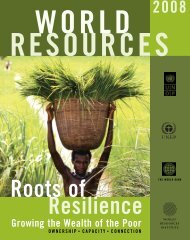jp8589 WRI.qxd - World Resources Institute
jp8589 WRI.qxd - World Resources Institute
jp8589 WRI.qxd - World Resources Institute
Create successful ePaper yourself
Turn your PDF publications into a flip-book with our unique Google optimized e-Paper software.
WORLD RESOURCES 2005<br />
In addition, we examine the factors besides governance and<br />
eco-friendly practices that support the evolution of environmental<br />
income for poverty reduction. These revolve around the need<br />
to find successful models to commercialize ecosystem goods and<br />
services, coping with such constraints as marketing, transportation,<br />
and the need to capture greater value from nature-based<br />
enterprises than the poor often do. In addition, we consider the<br />
potential for “payment for environmental services” (payments<br />
for preserving the functions of ecosystems, such as water supply<br />
or carbon storage) to contribute to the portfolio of incomegenerating<br />
enterprises based on nature that the poor can tap.<br />
In examining these factors, we put forth four steps to generate<br />
greater environmental income for the rural poor.<br />
1<br />
MORE INCOME THROUGH BETTER<br />
ECOSYSTEM MANAGEMENT<br />
Healthy ecosystems work at peak productivity; degraded<br />
ecosystems produce less, particularly of the forest products,<br />
forage, clean water, crops, and bushmeat on which the poor<br />
tend to rely. In fact, degradation of ecosystem functions—in<br />
the form of nutrient-depleted soils, overgrazed pastureland,<br />
logged-over and fragmented forests, and overfished lakes and<br />
coastal waters—has become a serious impediment to the livelihoods<br />
of the poor.<br />
As the findings of the recently concluded Millennium<br />
Ecosystem Assessment show, ecosystem decline is widespread.<br />
The global drop in ecosystem health not only undermines the<br />
natural resource base that anchors a substantial fraction of the<br />
global economy but erodes the planet’s life-support systems more<br />
generally (MA 2005a:1-24). The most immediate victims of this<br />
decline are the poor, whose household economies, as shown in<br />
Chapter 2, depend heavily on ecosystem goods and services. The<br />
pressures on ecosystems are particularly intense on many<br />
common property lands and fisheries—the most important<br />
source of environmental income for the rural poor. Examples are<br />
many and distributed on every continent and sea: denuded hills<br />
in western India; exhausted forests in Madagascar and Haiti;<br />
and depleted catches off Indonesia, Jamaica, or Fiji are just a few<br />
of the many instances where overuse and abuse of ecosystems<br />
directly impacts the poor.<br />
Better Management<br />
Requires an Ecosystem Approach<br />
But ecosystem decline is not inevitable. Ecosystems are resilient<br />
and can be sustained through practices that accommodate their<br />
80

















